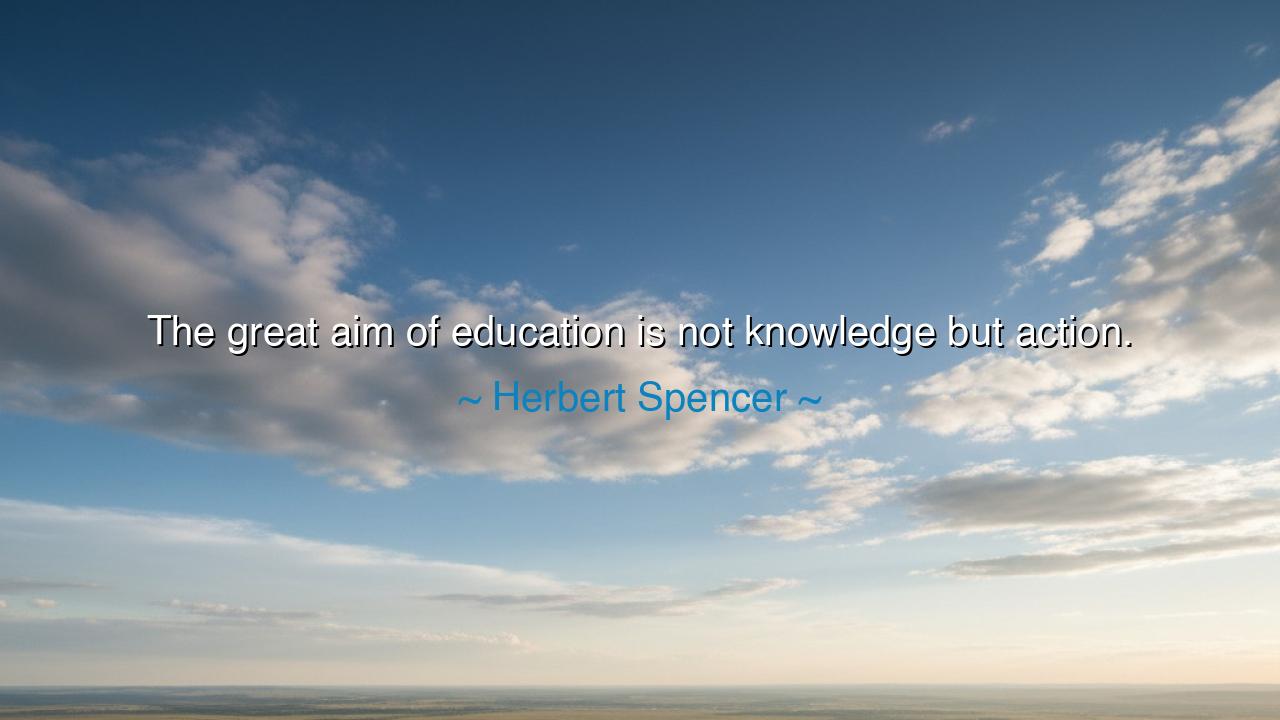
The great aim of education is not knowledge but action.






The words of Herbert Spencer — “The great aim of education is not knowledge but action” — strike like a hammer against the anvil of complacency. They remind us that learning, though noble in its pursuit, fulfills its highest purpose only when it is lived. To know and not to act is to see the dawn and never rise with it, to understand truth and yet let it fade into silence. Spencer, the English philosopher of the nineteenth century, wrote in an age bursting with scientific discovery and intellectual pride. Yet even then, he saw that the danger of knowledge without application was a disease that could hollow out both the mind and the soul. His words remain a clarion call across the centuries: that the measure of wisdom is not how much one knows, but what one does with what one knows.
In this teaching lies a principle older than any book or school — that learning is a sacred flame meant not to be admired, but to illuminate the world. The ancients knew this truth well. Socrates did not teach men merely to think, but to live with reason and virtue. Confucius did not gather students to memorize words, but to embody justice and harmony in the conduct of their lives. For knowledge without action is like a tree that bears no fruit — beautiful in appearance, but lifeless within. Spencer saw that education, when confined to theory, breeds arrogance instead of understanding, and stagnation instead of progress. But when knowledge is transformed into action, it becomes the seed of civilization itself — capable of healing, building, and transforming the world.
The wisdom of this quote shines through the deeds of those who turned learning into life. Consider Florence Nightingale, who was educated in mathematics and philosophy, but found her calling not in theory, but in service. When war ravaged Crimea, she carried her knowledge into the field, transforming hospitals and saving countless lives through the application of sanitation and care. She understood that numbers meant little if they did not ease suffering, and that study without compassion was vanity. Her education was not a collection of facts — it was a weapon for mercy. And through her action, she turned learning into light, proving that knowledge finds its truest meaning only when it serves humanity.
In contrast, history offers warnings of those who learned much but did little. There were scholars in ancient Rome who could recite the philosophies of Greece, yet watched idly as their Republic decayed into tyranny. Their wisdom filled scrolls but not their hearts. They debated justice but did not defend it, and so they perished in the shadow of their own passivity. For it is not ignorance that destroys nations, but educated men who lack the courage to act upon what they know to be right. Spencer’s words echo this eternal truth — that education divorced from moral and practical purpose becomes a burden, not a blessing.
To act is not to abandon contemplation, but to complete it. The true scholar must walk the path of both the thinker and the doer. Thought gives vision; action gives reality. Together they form the rhythm of progress — the heartbeat of every age that has moved from darkness into light. The invention of the printing press, the fight against slavery, the discovery of medicine — all were born from minds that refused to let knowledge remain idle. The scientist, the teacher, the builder, the artist — all are heirs to this same command: learn so that you may create, not merely accumulate.
In our time, Spencer’s teaching is more vital than ever. We are surrounded by information — oceans of it — yet wisdom seems scarce, and courage scarcer still. Many study the world but few strive to change it. We must return to the ancient purpose of learning: not to fill the mind, but to awaken the spirit. Let your education, whether formal or hard-won through experience, move you toward deeds that matter. Let every truth you discover become a step you take. For knowledge that sleeps in the mind is a shadow, but knowledge that moves the hands and heart is light incarnate.
Thus, the lesson of Herbert Spencer’s words is eternal: learn to act, and act to serve. Do not seek wisdom merely to know, but to live rightly, to heal, to build, to uplift. Let every book you read, every idea you gain, be tested by the life you lead. For the greatest teacher is not the one who imparts understanding, but the one who inspires movement. And the greatest student is not the one who knows most, but the one who does most good with what he knows.
So remember, as you walk the road of knowledge: the end of all learning is action — not applause, not pride, not memory. To live what you know is to turn wisdom into power, and power into grace. And when you act upon truth, you fulfill the highest aim of education: not to fill the mind, but to awaken the soul to its purpose.






AAdministratorAdministrator
Welcome, honored guests. Please leave a comment, we will respond soon